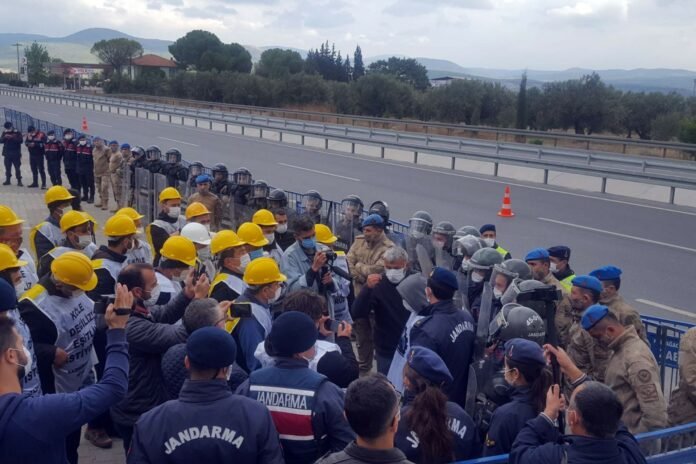Miners protesting the lack of compensation for a mining disaster that took place in Turkey in 2014 were manhandled and detained by gendarmes and forced to halt their protest, Turkish media reported.
The miners had been protesting in an open green space in western Turkey’s Manisa province. They had wanted to walk to Ankara, but the Manisa gendarmerie stopped and detained them. Videos on Twitter of the gendarmes manhandling the workers have attracted much criticism.
Ankara'ya yürüyen Somalı madencilerin direnişi sürüyor: Jandarma tarafından ablukaya alındılar, saldırıda bir madenci yaralandı!https://t.co/P2JZhQHzj3 pic.twitter.com/N6WLAX5V4a
— Gazete Yolculuk (@gazeteyolculuk) November 4, 2020
The Ministry of Interior tried to prevent the protest from taking place despite a Constitutional Court decision stating that marching between cities as an act of protest was permissible. The gendarmes dispersed the protesters and detained the miners.
The miners are from Soma, a mining town in Manisa that witnessed one of the nation’s worst mining disasters. An explosion inside a coal mine caused a fire that burned for two days and trapped nearly 600 miners underground. A total of 301 miners died in the tragic incident.
The court acquitted more than 30 defendants from among 51 who had been tried over the deaths. The defendants faced charges of manslaughter and negligence of safety measures, according to the final plea by the prosecutor. The surviving miners were entitled to compensation for damages since the mine was destroyed and they could not continue to work.
Başaran Akarsu from the Independent Mining Union (Bağımsız Maden İş Sendikası), was released following interrogation. After his release he made a statement with the miners and said they would not return to the mines in Soma. Akarsu said they wanted a solution and for the voices of the miners to be heard.
“They lied to us when they said they would pay our compensation. They protected the companies and violated the rights of the workers,” Akarsu said.
The verdicts handed down by the court were far lighter than sought by the prosecutors when the trial started in April 2015. The prosecutors had at the time asked that the top managers be sentenced to 25 years in prison for every one of the 301 victims. However, two company officials were sentenced to nearly 19 years, and the chairman of the company received 15 years.















